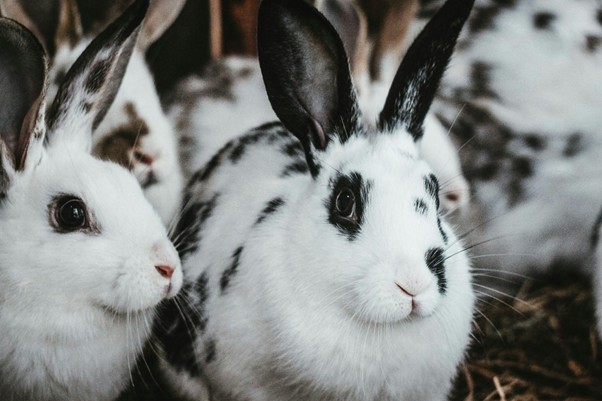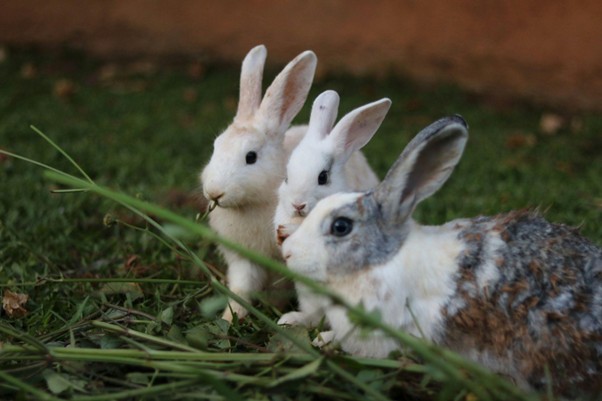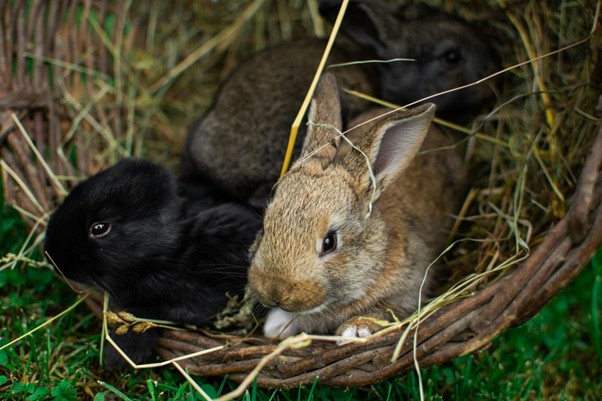Common Parasites in Rabbits: Spotting the Signs for a Healthier Herd
.jpg)
Rabbit parasites can severely impact the pet's health; they cause irritation, weight loss, poor coat condition, and even death in severe cases. External parasites like mites, fleas, and ticks affect the skin and fur, while internal parasites such as coccidia and worms damage the digestive system.
Good hygiene, routine checks, proper nutrition, and timely treatment are key to preventing infestations and keeping rabbits healthy and productive.
Common Parasites in Rabbits

Rabbits are prone to both external and internal parasites, each affecting health, growth, and productivity in different ways. Understanding their symptoms, active seasons, high-risk periods, and transmission methods helps owners manage infestations effectively.
External Parasites in Rabbits
Some of the most common external parasites in rabbits are fur mites, ear mites, blowflies, fleas, lice, and ticks. They cause skin, hair, and ear infections that can reduce the quality of life of the herd.
Fur Mites
Fur mites are tiny external parasites that live on the surface of the rabbit's fur. They feed on skin debris and oils.
- Symptoms: Intense itching, hair loss, a flaky or greasy coat, restlessness, and skin irritation.
- Season: Can occur year-round but is often worse in colder months when rabbits are housed indoors.
- High-Risk Periods: Winter or in crowded, poorly ventilated housing.
- Transmission: Direct contact with infested rabbits or contaminated bedding, grooming tools, and cages.
Ear Mites
Ear mites are tiny parasites that live inside a rabbit’s ear canal, feeding on skin debris and causing intense irritation and infection.
- Symptoms: Head shaking, scratching at ears, thick crusts or scabs inside ears, hair loss around the ears, and a foul odor.
- Season: Can occur any time of year, but more common in cooler months or when hygiene is poor.
- High-Risk Periods: When rabbits are kept in damp, dirty, or overcrowded housing or come into contact with infested animals.
- Transmission: Spread through direct contact with infected rabbits or contaminated bedding, grooming tools, or cages.
Blowflies (Flystrike)
Blowflies cause flystrike, a serious condition where flies lay eggs on the rabbit’s skin or soiled fur. The maggots that hatch feed on tissue, leading to pain, infection, and even death if untreated.
- Symptoms: Restlessness, loss of appetite, foul odor, wet or matted fur around the rear, visible maggots, and lethargy.
- Season: Most common in warm, humid months and late spring to early autumn.
- High-Risk Periods: When rabbits have soiled fur (especially around the tail), open wounds, or poor grooming.
- Transmission: Adult flies lay eggs on damp or dirty fur; larvae hatch and burrow into the skin to feed on tissue.
Fleas
Fleas feed on rabbit blood, causing itching, anemia, and skin irritation.
- Symptoms: Intense scratching, hair loss, red or inflamed skin, restlessness.
- Season: Warm and humid months.
- High-Risk Periods: Spring and summer during peak flea activity.
- Transmission: Contact with infested animals, bedding, or wildlife.
Lice
Lice are small insects that feed on rabbit skin and blood, leading to irritation and poor coat condition.
- Symptoms: Hair loss, scratching, scabs, dull coat, reduced weight gain.
- Season: More common in winter.
- High-Risk Periods: When rabbits are crowded or poorly groomed.
- Transmission: Direct contact with infected rabbits or contaminated equipment.
Ticks
Ticks attach to the skin and feed on blood. They can also potentially transmit diseases and make the animals sicker.
- Symptoms: Skin irritation, scabs, anemia, weight loss, lethargy.
- Season: Spring through late summer, especially in warm, humid environments.
- High-Risk Periods: Outdoor grazing or contact with infested vegetation.
- Transmission: From vegetation carrying ticks or direct contact with infested animals.
Internal Parasites in Rabbits
Common internal parasites include Encephalitozoon cuniculi, pinworms, tapeworms, stomach worms, and coccidia. These parasites primarily affect the digestive system, kidneys, nervous system, nutrient absorption, and immunity.
Coccidia
Coccidia are microscopic protozoa that infect the intestines, particularly in young rabbits.
- Symptoms: Diarrhea (sometimes bloody), dehydration, poor growth, and lethargy.
- Season: Thrive in warm, humid conditions.
- High-Risk Periods: Crowded or unhygienic pens; during weaning.
- Transmission: Ingestion of oocysts from contaminated feed, water, or environment.
Encephalitozoon cuniculi
A microscopic parasite affecting the nervous system and kidneys of rabbits.
- Symptoms: Head tilt, tremors, loss of coordination, urinary issues.
- Season: Active year-round, but stress increases susceptibility.
- High-Risk Periods: Young rabbits, immunocompromised, or stressed animals.
- Transmission: Ingestion of spores from the urine of infected rabbits or contaminated surfaces.
Pinworms
Intestinal worms that live in the colon and cecum can cause digestive disturbances.
- Symptoms: Itching around the anus, diarrhea, poor growth.
- Season: Most active in warm months.
- High-Risk Periods: Crowded conditions or poor sanitation.
- Transmission: Ingestion of eggs from contaminated bedding, feed, or water.
Tapeworms
Flatworms in the intestines that absorb nutrients and may stunt growth.
- Symptoms: Poor weight gain, diarrhea, pot-bellied appearance, and segments visible in feces.
- Season: Year-round, depending on intermediate host availability.
- High-Risk Periods: Outdoor grazing in areas with intermediate hosts.
- Transmission: Ingestion of intermediate hosts carrying larvae (e.g., insects).
Stomach Worms
Small worms inhabiting the stomach that interfere with digestion and nutrient absorption.
- Symptoms: Diarrhea, weight loss, poor coat condition, lethargy.
- Season: Cool, moist seasons favor larval survival.
- High-Risk Periods: Spring and fall in damp or overgrazed areas.
- Transmission: Ingestion of larvae from contaminated feed, water, or pasture.
Symptoms of Parasites Affect Your Rabbits

Each parasite causes a unique set of symptoms in rabbits. Spotting these signs early helps farmers provide timely treatment and support herd health. The table below summarizes common symptoms of parasites and their effects for quick reference.
Risk Periods for Parasites in Rabbits

Certain periods and conditions increase the risk of parasite infestations in rabbits. Recognizing these high-risk situations helps owners take preventive measures and protect their rabbits' health.
Young Rabbits (Kits)
Kits have underdeveloped immunity, which makes them more susceptible to both internal and external parasites like coccidia and fur mites.
Pregnant/Lactating Rabbits
Pregnant and lactating does are under physiological stress, which can reduce their resistance to parasites and increase vulnerability.
High-Density Herds
Rabbits kept in crowded pens or hutches are more likely to spread parasites quickly through direct contact or contaminated bedding.
Wet, Warm Seasons
Parasites thrive in warm, humid conditions, making spring and summer high-risk periods for infestations.
Overgrazed or Short Pastures
Overgrazed areas force rabbits to feed close to the ground, increasing the chance of ingesting parasite eggs or larvae.
Introducing New Rabbits
Newly purchased or relocated rabbits can carry parasites that spread quickly if not quarantined and treated before joining the existing group.
Complications from Parasite Infections in Rabbits
Parasite infections in rabbits can lead to a variety of health problems, affecting both growth and overall well-being. The severity often depends on the age and condition of the animal, with young and older rabbits being particularly vulnerable.
Effects on Young Rabbits (Kits)
Kits are especially prone to parasite-related complications due to their underdeveloped immune systems. Infestations can cause:
- Poor growth and weight gain
- Diarrhea and dehydration
- Weakness and lethargy
- Increased susceptibility to secondary infections
- If untreated, severe infestations can be fatal in young rabbits.
Effects on Adult and Older Rabbits
In mature or older rabbits, parasite infections may not always be life-threatening but can significantly affect health and productivity. Common complications include:
- Poor reproductive performance
- Weight loss and reduced body condition
- Rough or patchy coat
- Increased vulnerability to other diseases due to weakened immunity
How to Control Parasites in Rabbits

Effective parasite control in rabbits requires a combination of preventive care, regular monitoring, and targeted treatments. By addressing internal, external, and general control measures, owners can maintain healthy, productive rabbits.
Internal Parasite Control in Rabbits
- Regular Deworming: Administer anthelmintics as advised by a veterinarian, based on fecal tests.
- Clean Feeding: Provide uncontaminated, fresh feed and water to prevent ingestion of parasite eggs or larvae.
- Rotational Housing: Clean hutches regularly and rotate bedding to reduce parasite buildup.
- Monitor Young Rabbits: Kits are highly susceptible; monitor for diarrhea, poor growth, and lethargy.
- Quarantine New Rabbits: Treat and observe new rabbits before introducing them to the group.
External Parasite Control in Rabbits
- Regular Inspection: Check for mites, fleas, lice, and ticks, especially in ears, underbelly, and tail area.
- Topical Treatments: Use approved sprays, dips, or powders for external parasites.
- Clean Housing: Maintain dry, well-ventilated hutches and regularly disinfect cages.
- Pasture Management: Remove tall grass, weeds, and debris to limit exposure to ticks and fleas.
- Isolate Infested Rabbits: Separate and treat affected rabbits promptly to prevent spread.
General Parasite Control in Rabbits
- Hygiene: Keep bedding, feeding areas, and water sources clean and dry.
- Nutrition: Provide a balanced diet to strengthen immunity and resilience against infections.
- Manure Management: Regularly remove droppings to reduce parasite eggs and larvae in the environment.
- Monitoring: Observe rabbits for changes in weight, coat, and behavior to detect early infestations.
- Veterinary Guidance: Develop a strategic parasite control plan with a veterinarian, based on local risks and resistance patterns.
Expert Suggestions for Effective Parasite Control in Rabbits
Effective parasite management in rabbits depends on timely intervention, preventive care, and avoiding common mistakes. Here are expert recommendations to keep your rabbits healthy and productive.
Best Time to Deworm
- Deworm kits at 4 to 6 weeks of age and repeat as advised by a veterinarian.
- Treat adult rabbits seasonally, especially before and after the wet season when parasite activity peaks.
- Base treatments on fecal testing rather than fixed schedules to ensure effective parasite control.
- Deworm rabbits before introducing them to new housing or pastures to reduce reinfection.
Natural Remedies That Help
- Herbal supplements such as garlic, pumpkin seeds, and neem leaves may help reduce internal parasite loads.
- Tannin-rich forages (e.g., chicory) can naturally inhibit worm growth.
- Maintain dry bedding and good hygiene to reduce external parasite infestations.
- Combine natural remedies with strategic deworming for the best results.
Common Mistakes Farmers Make
- Overusing dewormers, which leads to parasite resistance.
- Skipping fecal testing and relying solely on routine deworming.
- Ignoring external parasite control and focusing only on internal worms.
- Not quarantining new animals, which in turn allows parasites to spread to the herd.
- Overlooking record-keeping and not seeking timely veterinary intervention to treat the symptoms.
Signs That Parasite Control Is Working
In rabbits, successful parasite control shows through smooth, clean fur, clear eyes, and increased appetite. You'll notice reduced scratching, normal droppings, and active, social behavior. Healthy growth rates and shiny coats are reliable indicators that internal and external parasites are well managed.
Use FarmKeep for Rabbit Management
Whether you're managing a few rabbits or an entire colony, staying organized is key to healthy, productive animals. That's where FarmKeep, the all-in-one farm management app, helps.
With FarmKeep, you can:
- Record health details such as deworming dates, vaccinations, weight, and vet visits.
- Monitor breeding cycles with kindling dates and litter records.
- Set reminders for parasite control, grooming, or feed changes.
- Store photos and notes for easy reference during care or breeding decisions.
FAQs
How often should I deworm rabbits?
Deworm kits at 4 to 6 weeks and follow a veterinarian-recommended schedule for adults.
How can I naturally control ticks and flies in rabbits?
The best way to naturally control ticks and flies in rabbits is by keeping their housing clean and dry, using herbal sprays like neem or garlic oil, trimming tall grass, and rotating bedding regularly.
How to protect rabbits during pregnancy from parasites?
Deworm before breeding, provide balanced nutrition, and maintain clean, dry housing to reduce parasite exposure.
What are the common intestinal parasites in rabbits?
The most common internal parasites are coccidia, pinworms, tapeworms, stomach worms, and Encephalitozoon cuniculi.
What are the key symptoms of parasitism in rabbits?
Symptoms of parasitism in rabbits are diarrhea, poor growth, weight loss, lethargy, rough coat, itching, hair loss, and abnormal behaviors like head tilts.
How do I prevent and control parasite outbreaks in rabbits?
To prevent and control parasite outbreaks in rabbits, farmers and pet owners must practice good hygiene, rotational cleaning and grazing, strategic deworming, fecal monitoring, and quarantine new rabbits before introducing them to the herd.



